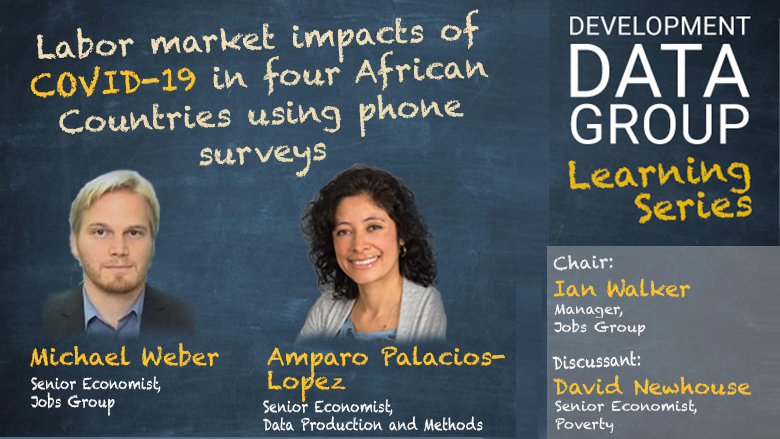Attempts to limit the spread of COVID-19 have taken a considerable toll on the global economy. Our study provides an overview of the labor market impacts of the pandemic among individuals in Ethiopia, Malawi, Nigeria and Uganda. The analysis is based on the data from the first wave of World Bank-supported phone surveys, conducted during the period of May-June 2020. Our headline findings are as follows: First, the impact on the labor market has been heterogenous across countries and is related to the stringency and compliance with government’s containment policies. In Nigeria 38% reported having stopped working due to COVID-19, while in Malawi this number is 6%. Second in all four countries, urban jobs were lost in higher proportion than in rural areas. Third, the commerce and services sectors were most affected throughout the four countries. Fourth, households have experienced substantial economic shocks following the pandemic. Increases in the price of major food items consumed, closure of nonfarm businesses, increases in the price of farming/business inputs, and decrease in output prices were most widely experienced. Fifth, to cope with the considerable economic shocks, households not only draw down their savings but also reduce food consumption. Sixth, after initial checks, phone surveys appear to provide a valid proxy for understanding labor market and income dynamics in these four countries during the pandemic. Lastly, phone surveys could be used more to quickly learn about the immediate reach of government policies to address the labor market impacts of COVID-19. The webinar will discuss these findings as well as upcoming work to continue monitoring the crisis in Ethiopia, Malawi, Nigeria, and Uganda.
Labour market impacts of COVID-19 in four African countries using phone survey
September 30, 2020
Virtual Conference
MULTIMEDIA
-
Amparo Palacios-López is a Senior Economist in the Data Production and Methods Unit of the Development Data Group of the World Bank. Her primary area of research is development, with a focus on labor, gender, and welfare. She conducts research on survey methods, focusing on labor and agriculture, the recent focus of her methodological research has been on labor and gender working jointly with the Gender Group of the World Bank and the International Labor Organization. As a member of the Living Standards Measurement Study team, she supports surveys in several countries of Sub-Saharan Africa and leads the design of the questionnaires used in surveys in Latin America, Asia and the Middle East. She is part of the team of coordinators of the Household Survey Working Group and its Technical Review Panel. She has a Ph.D. in Agriculture and Resource Economics from the University of Maryland, College Park., and holds both an M.A. in Economics from the Pontificia Universidad Católica de Chile.
Michael Weber is Senior Economist with the World Bank’s Jobs Group and co-Lead of the Labor & Skills Global Solutions Group of the Social Protection & Jobs GP. He engages on jobs diagnostics, lending, labor law reform, and impact evaluation projects with governments in East Asia, Latin America, and Sub-Saharan Africa. He has published articles and worked on labor regulations, youth employment, informality, active labor market policies, and social insurance schemes. In recent years, Michael has also been active in monitoring global and regional job trends and contributed toolkits for labor market analysis, jobs indicators, as well as research on data quality issues.
-
Join using WebEx
Meeting number
172 693 5306
Meeting password
WyZpGSjk438
